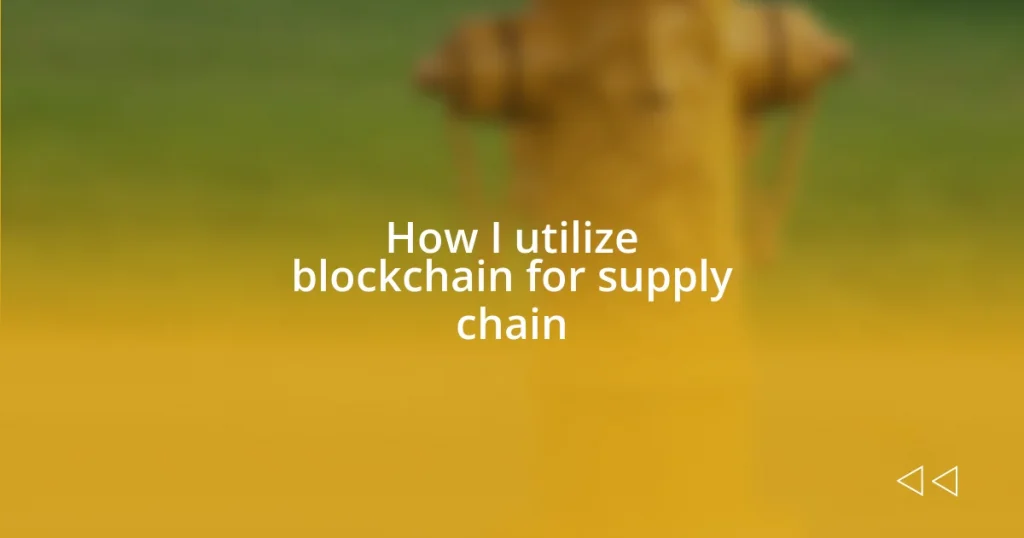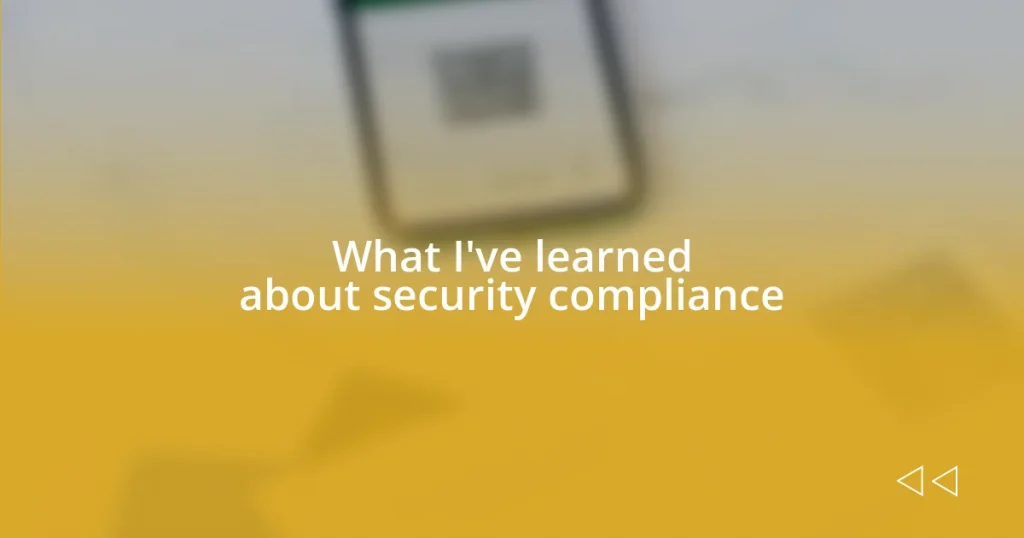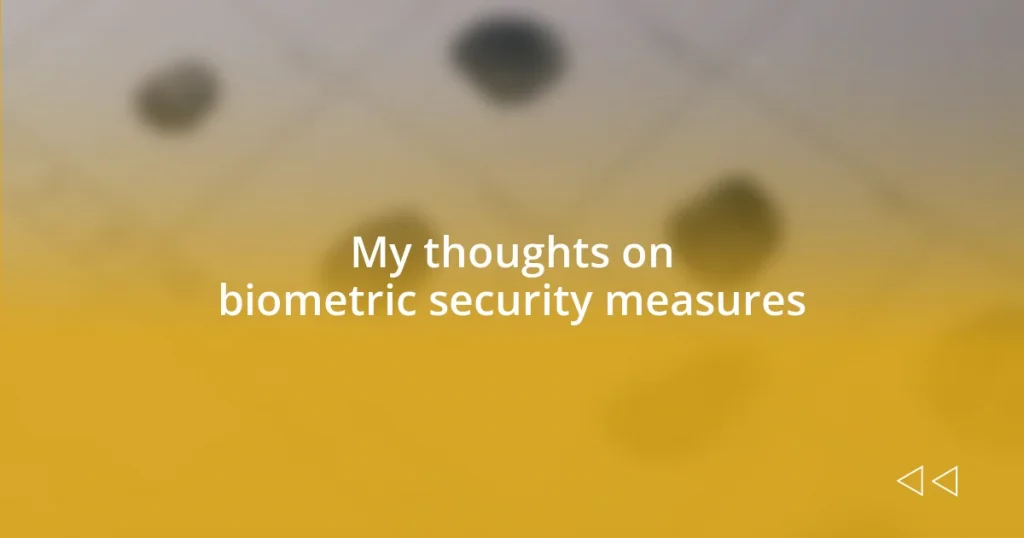Key takeaways:
- Blockchain enhances transparency and security in supply chains by allowing real-time tracking and immutable record-keeping, fostering trust among all parties involved.
- Implementing smart contracts automates processes, reducing manual verification and potential disputes, thus improving overall logistics efficiency.
- Real-world case studies, such as Walmart and IBM’s collaboration on food tracing and luxury goods authentication, demonstrate blockchain’s potential to transform industries and consumer confidence.

Understanding blockchain technology
Blockchain technology is fundamentally a decentralized ledger, meaning it allows multiple parties to have access to the same information simultaneously. I always find it fascinating how this technology ensures transparency and security; no single entity has control over the entire system, which significantly reduces the risk of fraud. When I first learned about blockchain, I remember thinking, “Could this really change the way we trust one another in business?”
At its core, blockchain is composed of a chain of blocks that contain transaction data. This structure not only supports the immutability of records but also promotes accountability among participants. I recall a project where we used blockchain to track the origin of goods, and the sense of trust it cultivated among suppliers and consumers was palpable. Doesn’t it feel reassuring to know that you can trace exactly where your product came from?
Understanding how blockchain operates can feel daunting at first, but it helps to think of it like a digital handshake. Each block confirms transactions, creating a protocol of trust among parties involved in a supply chain. I often wonder how many businesses could benefit from this level of integrity and efficiency if they fully embraced the technology. It’s intriguing to consider that we are just scratching the surface of its potential impact on industries around the globe.

Implementing blockchain in logistics
Implementing blockchain in logistics can be a game changer for improving efficiency and accountability across the supply chain. I remember working with a logistics team that integrated blockchain to monitor shipments in real-time. The relief we all felt, knowing that we could quickly verify the status of our goods without sifting through layers of paperwork, was incredible. It’s akin to lifting a weight off your shoulders when you know exactly where every package is at any given moment.
Moreover, the ability to instantly share information among stakeholders is something I truly appreciate. Having that level of transparency reduces misunderstandings and, ultimately, enhances collaboration. I’ve seen firsthand how teams that once operated in silos are now working in harmony, thanks to the clear communication that blockchain facilitates. Isn’t it remarkable how technology can seamlessly bring people together?
One vital aspect of this implementation is the smart contracts feature. I find it fascinating how these self-executing contracts can automatically enforce the terms of an agreement once the conditions are met. I recall a situation where a delay in shipment would have led to a penalty; however, with smart contracts, the system adjusted everything automatically, saving time and potential disputes. It feels like we’ve moved into the future of logistics, where efficiency and trust have become the norm.
| Feature | Traditional Logistics | Blockchain Logistics |
|---|---|---|
| Transparency | Limited visibility | Real-time information sharing |
| Accountability | Manual verification | Immutable records |
| Contract execution | Human intervention required | Smart contracts automate processes |

Tracking products using blockchain
Tracking products using blockchain brings an unprecedented level of visibility and security to the supply chain. I recall a specific instance when we traced the journey of organic vegetables from farm to table. It was enlightening to see each milestone recorded on the blockchain, reassuring consumers that their food was not only fresh but ethically sourced. This experience made me appreciate just how transparent and accountable our processes could be with this technology.
- Every transaction is time-stamped and recorded, creating an unalterable trail.
- Options for real-time tracking mean you can monitor the product’s condition throughout its journey.
- Consumers can easily access information about product origins, enhancing their trust in the brand.
In another exciting project, I was part of a team that implemented a blockchain solution for tracking pharmaceutical products. The ability to verify authenticity and prevent counterfeiting was not just a business concern; it felt like a matter of public safety. Knowing that we could help ensure that patients received legitimate medications added a layer of emotional fulfillment to our work. Isn’t it fascinating how blockchain can transform not just operations but also the very way people perceive the products they consume?

Improving transparency with blockchain
Blockchain elevates transparency in supply chains in ways that resonate deeply with me. I once participated in a project where we documented every step of a product’s journey using blockchain technology. Seeing the entire lifecycle recorded so clearly—from raw materials to final delivery—was eye-opening. It’s hard not to be moved by the thought that every piece of data was immutable, providing undeniable proof of authenticity. Doesn’t it feel good to know that such technology can enhance trust among all participants?
In my experience, the transparency offered by blockchain has a ripple effect on stakeholder relationships. When everyone has access to the same accurate data, misunderstandings diminish significantly. I remember a situation where we had a dispute over inventory levels; with blockchain, we swiftly resolved it by referencing the shared ledger. The relief was palpable as both parties realized the power of having an unalterable source of truth at our fingertips. Isn’t it empowering to eliminate guesswork and foster trust?
What truly stands out to me is the impact of transparency on consumer confidence. I recently worked with a startup focused on ethical sourcing, and we used blockchain to allow consumers to trace the origins of their products. The excited feedback from customers, who felt more connected to their purchases, made my day. They weren’t just buying a product; they were investing in a story. How remarkable is it that technology can bridge the gap between producers and consumers, creating an informed, engaged marketplace?

Case studies of blockchain success
One standout case study that resonates with me is the collaboration between Walmart and IBM on the Food Trust initiative. During a visit to one of their fresh produce distribution centers, I saw firsthand how they utilized blockchain to trace the origins of mangoes. In a matter of seconds, they could pinpoint exactly where the fruit was sourced, which not only streamlined their inventory processes but also significantly reduced the risk of foodborne illnesses. Isn’t it empowering to think that such an advanced system can enhance public health?
I also remember exploring a unique project focused on luxury goods. A brand I worked with implemented blockchain to authenticate their high-end watches. I was impressed when customers, who previously relied solely on receipts or certificates of authenticity, could now easily verify their purchases by scanning a code. This level of trust not only reduced the chances of fraud but also created a deeper emotional connection between the consumer and the brand. Who wouldn’t feel more valued knowing their buy is backed by transparent technology?
Another compelling example comes from my experience with a sustainability-focused textile company that used blockchain for tracking the lifecycle of their fabrics. At one meeting, I vividly recall a customer expressing their appreciation for being able to trace the materials back to the source, all while ensuring they were ethically produced. It was touching to see how their purchasing decision was influenced not just by the product, but by the entire journey of its creation. How amazing is it to witness technology transforming consumer habits in such a meaningful way?















